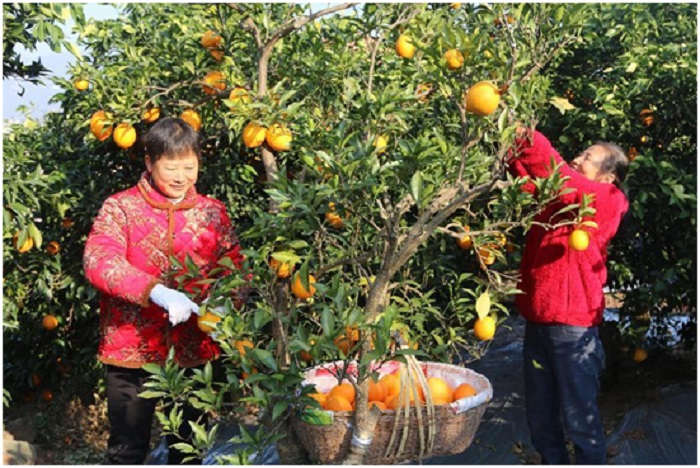



At this time of winter, Wangjiaqiao village, Shuitianba township, Zigui county, Yichang city, central China’s Hubei province, is beautifully decorated with citrus trees laden with golden fruits around people’s houses and on both sides of a newly upgraded road passing through the village.
With a mild climate and abundant rainfall, Zigui county is famous for citrus fruits, and Shuitianba township is one of the main citrus fruits producing areas in the county.
As the fruits have entered the mature season, trucks are running in a continuous stream on the road that winds up to the mountains in Wangjiaqiao village to collect fruits for sale.
“The transportation of citrus fruits used to be our biggest headache at this time of year in the past. Now that the road is so much wider than before, trucks can directly drive to our orchards, and we no longer worry that the fruits would rot in trees,” said Hu Xueping, a resident in the village.
“The cement road first built in 2008 was the only road connecting our village with the outside world. But it was only 3.5 meters wide, which was too narrow for large vehicles, and many parts of the road surface were damaged,” said Du Hailin, former secretary of the Communist Party of China (CPC) general branch committee in Wangjiaqiao village.
As the village witnessed continuous growth in the local citrus industry, its weak link of poor transportation conditions became particularly prominent, Du recalled.
After learning that local villagers hoped that the road would be widened, the villagers’ committee of Wangjiaqiao village added the transformation and upgrading of the road, which threads five villagers’ groups, onto its agenda.
A local democratic consultation mechanism named “evening talk of villagers’ group” has played a crucial role in the development of solutions to various issues concerning the transformation and upgrading of the road, including construction cost and compensation for land expropriation.
Since the village didn’t have sufficient funds for upgrading the road, it needed to ask villagers to share some of the expenditure on the project. The “evening talk of villagers’ group” mechanism helped formulate a plan that won wide support from villagers.
The “evening talk of villagers’ group” democratic consultation mechanism, which enables officials and villagers to discuss measures and ways to shake off poverty, increase income, and improve governance face to face, is one of the fruits of Zigui county’s active efforts to boost local economic and social development in recent years.
The county has divided its 186 villages into 2,055 villagers’ groups, each with 30 to 50 households and a management council. Villagers elect a head and eight members for each management council, and Party members elect the head of the CPC branch of the villagers’ group, which then form a team for self-governance.
In April 2020, the basic plan jointly proposed by the villagers’ committee and the Party committee of Wangjiaqiao village for the transformation and upgrading of the road was adopted at a meeting attended by representatives of villagers in Wangjiaqiao.
Shortly after the meeting, villagers’ groups involved in the project discussed details of the implementation of the plan through the “evening talk of villagers’ group” mechanism.
In the more than two months following the passage of the plan, a total of nearly 30 meetings were held in Wangjiaqiao village under the mechanism, with the number of participants reaching 700 person-times.
After repeated discussions with villagers, the villagers’ committee and the Party committee of Wangjiaqiao village finalized a plan for sharing the cost of the project and balancing land expropriation and compensation.
As of September 2020, all the 253 households involved in land expropriation in the project had signed the application for balancing land expropriation and compensation.
When it heard that Wangjiaqiao village decided to upgrade its road, the bureau of transportation of Zigui county immediately established a special working group for the project, and drew up a proposal for the transformation of the road linking Wangjiaqiao village and Qinghaoyu village in Zigui county into a 5-km two-lane fourth-grade highway.
At the same time, the bureau reported the road expansion project to the Department of Transportation of Hubei province and won 8.1 million yuan ($1.27 million) of rural road construction fund and other funds for the project.
In October 2020, the project officially kicked off. A year later, the 5-km asphalt concrete two-lane road was completed and opened to traffic. The upgraded road is 2.5 meters wider than the old one, with the roadbed 3 meters higher than before, becoming safer and smoother.
As the look of the road changed with each passing day during construction, Hu Kaijin, a resident in Wangjiaqiao village, passed his driving test and bought a car.
Although he had to cut down 88 citrus trees in his orchard to make way for the project, he said it was worth it, because the road has brought great changes to his life.
“Since large trucks can now collect citrus fruits at orchards, the transportation cost of fruits can be reduced by 0.2 yuan per kilogram, and the transportation efficiency has also been improved significantly,” said Hu Jing, chief of the CPC general branch committee in Wangjiaqiao village.
After the road was upgraded, many residents of the village working outside have returned to their hometown to start their own businesses, according to Hu.
Today, the village has more than 30 professional citrus production and marketing cooperatives and online stores, and the number of private cars in the village has exceeded 200.


The Executive and members of the.


The Acting Director, FCT Directorate of.


President Bola Ahmed Tinubu has been.



Barely a month after resignation of.


An Abuja based Legal Practitioner, Osuagwu.



Convener of Equitable Remedy, Mrs. Magaret.


Contractors handling the contract for city.


Nigerian government may have concluded plans.


The Diplomatic Correspondents Association of Nigeria.


A rights group, “Follow Me Talk.
Leave a Comment